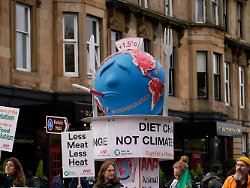Sunday, November 7th, 2021
Halfway through the climate conference
Will the COP26 cause a jolt?
The first of two weeks climate conference is over. States have issued letters of intent on methane emissions, the protection of forests and CO2 emissions. Critics see above all empty words in the confessions so far. Now there are first assessments from scientists.
The first week of the world climate conference COP26 in Glasgow is over. The negotiations resulted in a number of declarations of intent from participating countries, for example on methane emissions, the protection of forests and CO2 emissions. Great Britain’s Prime Minister Boris Johnson expects tough negotiations from the participating countries in the second week of the COP26 Climate Change Conference. “The COP26 has a week left to deliver,” said Johnson. “We all have to pull ourselves together and head for the finish line.”
Much criticism of what has been achieved so far was expressed by demonstrators at events in numerous cities and climate activists to the media. After a week’s climate conference, Luisa Neubauer drew a devastating interim balance. “As expected, a lot revolves around more or less empty speeches,” said Neubauer of the “Neue Osnabrücker Zeitung”.
Experts have so far been reluctant to assess what the declarations of intent of the first week of the conference could actually mean for the global climate. The following is an overview of the most important announcements and how they should be classified.
Main announcements
Since the beginning of COP26, the countries that are important for climate change, India, Brazil and Argentina, have announced tightening of their previous climate targets. In particular, India, which is one of the largest emitters of greenhouse gases due to its population size, disappointed the climate protectors: The country is now officially aiming for climate neutrality, but not until 2070.
Around one hundred countries have also pledged to reduce their emissions of the important greenhouse gas methane by 30 percent by 2030. Major emitters such as China, India, Russia and Australia are not involved here. After all, the countries Brazil and Russia, which are important in this area, have signed a declaration to stop deforestation by 2030.
First assessments
UN climate experts have analyzed the previous commitments made by the states – whether or not they have been improved – and come to the preliminary conclusion that if they were implemented, the increase in greenhouse gases in the atmosphere would still amount to 13.7 percent by 2030. Previously, they assumed growth of 16 percent compared to 2010. However, in light of the 1.5 degree target, the target is a 45 percent reduction in greenhouse gas emissions.
The UN environmental program UNEP also emphasized that these preliminary analyzes are by no means a calculation of the effects on the actual rise in temperature. “It’s still too early,” UNEP leader Inger Andersen told the media. “We don’t do calculations on the back of an envelope”. Scientific estimates and modeling would take time.
Other scientists are already daring to make initial predictions. According to an assessment by the University of Melbourne, “for the first time in history, the total effect of 194 countries’ commitments could keep warming below two degrees” – with a 50 percent probability. If all short, medium and long-term promises are kept, it would be possible to limit the temperature rise to 1.9 degrees.
The head of the International Energy Agency (IEA), Fatih Birol, said his team had made similar calculations and assumed in previously unpublished analyzes that the temperature rise could be limited to 1.8 degrees. However, words would have to be followed immediately by action, emphasized Birol. “It is important that governments now translate their promises into clear and credible policies and strategies.”
Climate activists point out that the Paris target of 1.5 degrees will continue to be exceeded. If the temperature rises above 1.5 degrees, “some countries will simply disappear from the map,” emphasizes Juan Pablo Osornio from Greenpeace. Climate activists therefore agree with politicians like US climate commissioner John Kerry: Much more needs to be done.
